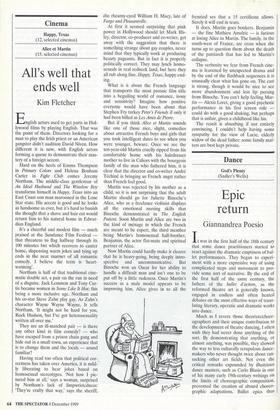Cinema
Happy, Texas (12, selected cinemas) Alice et Martin (15, selected cinemas)
All's well that ends well
Kim Fletcher
English actors used to get parts in Hol- lywood films by playing English. That was the point of them. Directors looking for a man to play the Irish priest or an American gangster didn't audition David Niven. How different it is now, with English actors forming a queue to demonstrate their mas- tery of a foreign accent.
Hard on the heels of Emma Thompson in Primary Colors and Helena Bonham Carter in Fight Club comes Jeremy Northam. The middle-class gentleman of An Ideal Husband and The Winslow Boy transforms himself in Happy, Texas into an East Coast con man marooned in the Lone Star state. His accent is good and he looks as handsome as ever, but it's hard to banish the thought that a shave and hair cut would return him to his natural home in Edwar- dian England.
It's a cheerful and modest film — much praised at the Sundance Film Festival that threatens to flag halfway through its 100 minutes but which recovers to canter home, dispensing warm jokes and tying up ends in the neat manner of all romantic comedy. I believe the term is 'heart- warming'.
Northam is half of that traditional cine- matic double act, a pair on the run in need of a disguise. Jack Lemmon and Tony Cur- tis became women in Some Like It Hot; this being a more inclusive age, Northam and his co-star Steve Zahn play gay. As Zahn's character Wayne Wayne Wayne, Jr tells Northam, 'It might not be hard for you, Rock Hudson, but I've got heterosexuality written all over me.'
They are an ill-matched pair — is there any other kind in film comedy? — who have escaped from a prison chain gang and hide out in a small town, an experience that is to change them and the locals — sound familiar?
Having read too often that political cor- rectness has taken over America, it is mild- ly liberating to hear jokes based on homosexual stereotypes. 'Not how I pic- tured him at all,' says a woman, surprised by Northam's lack of limpwristedness: 'They're crafty that way,' says the sheriff, the rheumy-eyed William H. Macy, late of Fargo and Pleasantville.
At first it seemed surprising that pink power in Hollywood should let Mark Ills- ley, director, co-producer and co-writer, get away with the suggestion that there is something strange about gay couples, never mind that they typically work at producing beauty pageants. But in fact it is properly politically correct. They may lynch homo- sexuals in real redneck land, but here they all rub along fine. Happy, Texas, happy end- ing.
What is it about the French language that transports the most prosaic film title into a beguiling world of romance, irony and sensitivity? Imagine how positive everyone would have been about that Stephen Fry turkey Peter's Friends if only it had been billed as Les Amis de Pierre.
But if you think Alice et Martin sounds like one of those nice, slight, comedies about attractive French boys and girls that you took intelligent dates to see when you were younger, beware. Once we see the ten-year-old Martin cruelly ripped from his comfortable home with his hairdresser mother to live in Cahors with the bourgeois family of the man who fathered him, it is clear that the director and co-writer Andre Techine is bringing us French angst rather than French feel good.
Martin was rejected by his mother as a child, so it is not surprising that the adult Martin should go for Juliette Binoche's Alice, who as a freelance violinist displays all the emotional nursing skills that Binoche demonstrated in The English Patient. Soon Martin and Alice are two in the kind of menage in which the French are meant to be expert, the third member being Martin's homosexual half-brother, Benjamin, the actor flat-mate and spiritual partner of Alice.
Now Martin could hardly make it clearer that he is heavy-going, being deeply intro- spective and uncommunicative. But Binoche won an Oscar for her ability to handle a difficult man and isn't one to be put off by a little rudeness. Once Martin's success as a male model appears to be improving him, Alice gives in to all the frenzied sex that a 15 certificate allows. Surely it will end in tears.
It does. Martin goes bunkers. Benjamin — the fine Mathieu Amalric — is furious at losing Alice to Martin. The family, in the south-west of France, are cross when she turns up to question them about the death of the patriarch that has led to Martin's collapse.
The verbosity we fear from French cine- ma is leavened by unexpected drama and by the end of the flashback sequences it is unusually clear what has gone on. The cast is strong, though it would be nice to see more abandonment and less lip pursing from Binoche. You can't help feeling Mar- tin — Alexis Loret, giving a good psychotic performance in his first screen role could do with a good shaking, but perhaps that is unfair, given a childhood like his. The result is absorbing if not entirely convincing. I couldn't help having some sympathy for the view of Lucie, elderly widow of the dead father: some family mat- ters are best kept private.


















































































 Previous page
Previous page